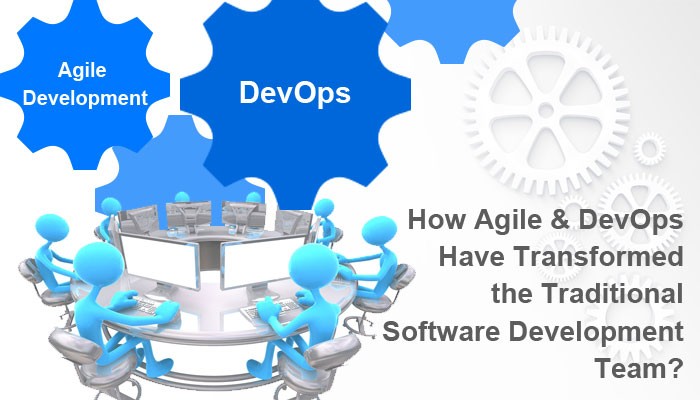The Transformation of Software Teams by Agile and DevOps
Over course of the past decade and a little more, software development has witnessed a sea change. Gone are the times when software development was a somewhat isolated process when development, business, operations and testing teams worked in their own siloes. As the need for software development speed increased, it led to the rise of new development methodologies. Agile and lean software development thus gained ground, as it helped development teams gain the momentum that they needed to put software into production and reduce the time-to-market. As the emphasis on digitization increased, agile development methodologies further evolved and we are now witnessing a rise of the DevOps culture.

How Agile and DevOps Transformed Software Development
DevOps further pressed the accelerator on the software delivery. Research from Puppet Labs shows that organizations using DevOps have been able to deploy code up to 30 times faster and that this code was 50 times less likely to fail — incredible! The rise of technologies such as Cloud and adoption of open-source technologies have further pushed organizations to adopt DevOps. A Gartner survey estimated that 25% of the 2000 global IT organizations planned to adopt DevOps in 2016 alone.
Cultural Shift: Beyond Tools and Methodologies
The success of methodologies such as agile and DevOps certainly hinges on the dexterity and capabilities of the development teams. At the same time, these methodologies demand a culture shift within the organizational environment too. Teams adopting these methodologies cannot work in siloes and expect project success. Clearly, one of the greatest contributors towards the success of these methodologies is a collaboration between teams and departments.
From Agile to DevOps: Driving Deeper Collaboration
Most considering DevOps to be the extension of agile, it becomes apparent that there is a need for greater collaboration between the software development team, the IT professionals, and the business team. The idea here is to develop user-centric software, and to do that successfully, development teams need access to faster user feedback. There is also an increased emphasis on software automation to increase the speed of delivery and the focus is on creating an environment where development, testing, and product releases proceed seamlessly like a well-oiled machine. In order to do so, there has to be a tighter integration of QA and operations in the development process itself. That implies a team structure with business, development, quality, and operations, all tied together.
DevOps Teams: Cross-Functional, Poly-Skilled, and Autonomous
Development methodologies such as DevOps requires poly-skilled and autonomous teams that have a set of common goals. Unlike traditional software development where the development team produced the code and simply handed it off to the testing and QA team for evaluation, in these modern day methodologies, the development and operations team have to function collectively as they are equally responsible for the service and product maintenance.
The Role of DevOps Engineers in Enabling Quality
Instead of just focusing on one aspect of development and production, DevOps engineers have to assist the development and QA team and help them address the development needs so that the final product that is delivered is of high quality, is error free and can be pushed out for production within the shortest timeframe. From automating builds to setting up servers to writing custom scripts for a specific technology stack, DevOps engineers have to act as the ultimate facilitators for high-quality software development.
Organizational Flattening and the Need for Convergence
A bit from Thomas Friedman's book 'The World is Flat'' talks about the change in culture and organizational shift as the world transforms, and this could apply to these development methodologies as well. He states that factors such as globalization, the opening of borders of developing countries, progress of software and growth of the internet are compelling the software industry to seek flatter structures in order to achieve competitive success. This demands not only the flattening of software releases but also of organizational structures which are only made possible by the "convergence of automation, tools, collaboration, and industry best practices and patterns."
The Rise of New Hybrid Roles in DevOps and Agile
The motivation behind developing methodologies such as Agile and DevOps and using them in conjunction was to take the frustration of releasing and maintaining software out of software development. To do this, teams have to be cross-functional and experienced not only in development but also in areas such as database, configuration management, testing and infrastructure which can only be possible when development and operations teams work collaboratively. Thus we have seen the rise of developer-testers, release managers, automation architects, security engineers, utility technology players and experience assurance experts etc. who not only understand development but also understand business operations and user requirements.
Breaking Traditional Roles for Modern Success
As the velocity of software development increases, the traditional, role-bound software development team becomes increasingly redundant. With these new philosophies, every role is shifting and evolving. Teams thus need a wider understanding of what they need to achieve, develop it, test it and then deploy it.Thus, the role of the developer does not end with producing certain lines of code and the tester is not just expected to assess if a certain functionality is achieved. Everyone in the value chain is required to validate the user experience of the application under real-life conditions and scenarios.
From Projects to Products: A Mindset Shift
Companies that have adopted Agile and DevOps successfully have only been able to do so when they realized that they have to simplify the fragmented product development process and improve interactions between business and IT and move from a project-oriented to a product oriented mindset.
Share This Article:






